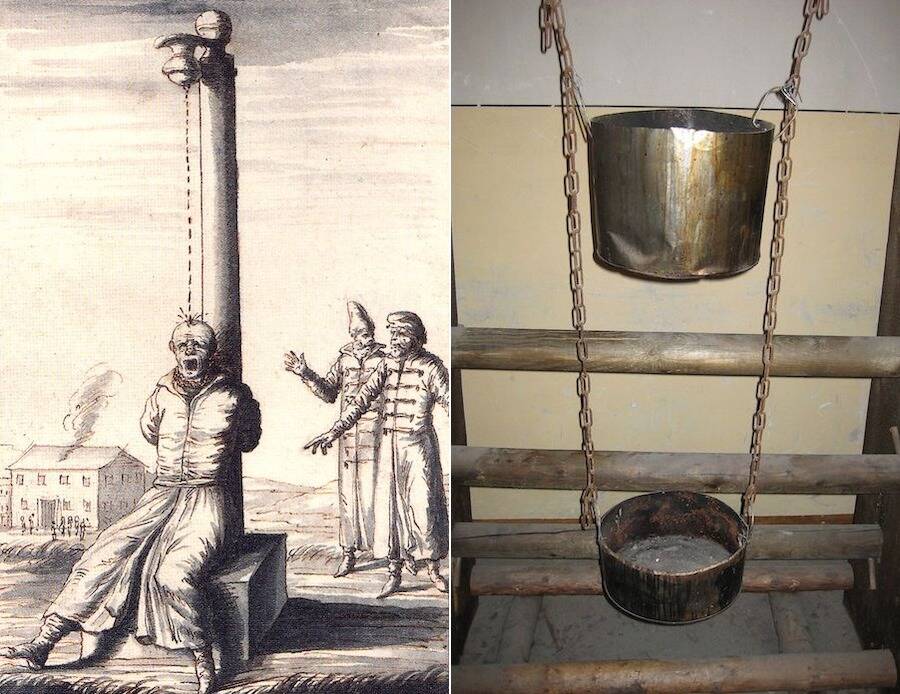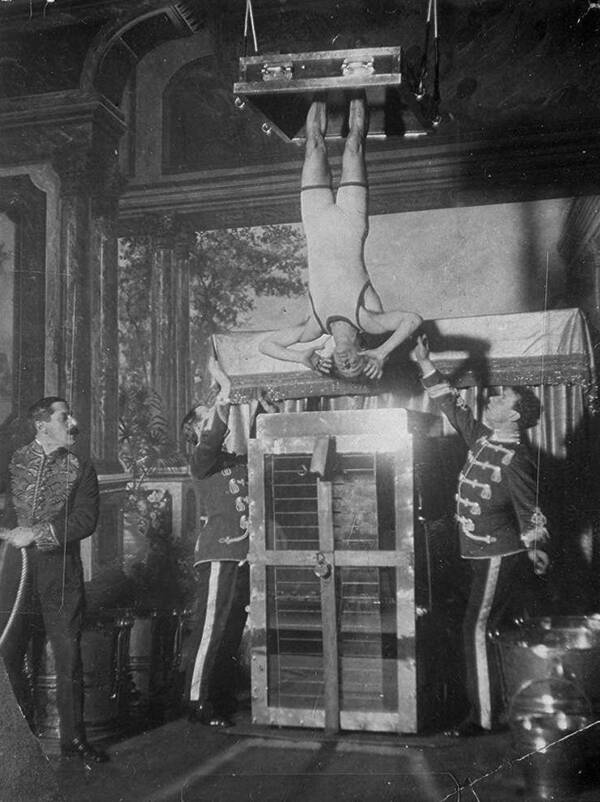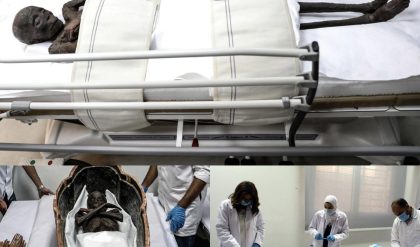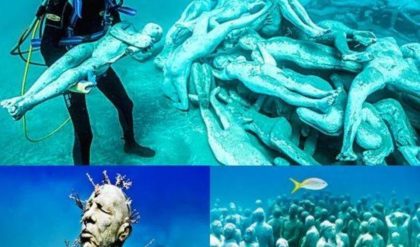
Wikimedia CommonsA 1674 illustration from Sweden depicting Chinese water torture (left) and a reproduction of a water torture device on display in Berlin (right).
Human beings have inflicted untold suffering on each other since the dawn of time. Over the centuries, people have worked to devise constantly evolving forms of punishment and coercion. Compared to devices like the Iron Maiden or chains and whips, Chinese water torture may not sound particularly grueling, but history begs to differ.
Medieval torture devices typically used razor-sharp blades, ropes, or blunt instruments to pry confessions from subjects. Chinese water torture was more insidious, however.
According to the New York Times Magazine, the torture method involves holding a person in place while slowly dripping cold water on their face, forehead, or scalp. The splash of water is jarring, and the victim experiences anxiety while trying to anticipate the next drop.
From the Vietnam War to the War on Terror, other methods of “enhanced interrogations” using water such as simulated drowning or waterboarding have largely sidelined general curiosity about Chinese water torture. But while scarce evidence of its actual implementation exists, Chinese water torture has a long and fascinating history.
The Grisly History Of Chinese Water Torture
While the historical record on Chinese water torture is lacking, it was first described in the late 15th or early 16th century by Hippolytus de Marsiliis. The Bologna, Italy native was a successful lawyer, but he is best known for being the first to document the method that is today known as Chinese water torture.
Legend has it that de Marsiliis devised the idea after noticing how the continuous dripping of water upon stone eventually eroded away parts of the rock. He then applied this method to humans.
According to the Encyclopedia of Asylum Therapeutics, this form of water torture withstood the test of time, as it was used in French and German asylums in the mid-1800s. Some doctors at the time believed insanity had physical causes and that water torture could cure patients of their mental afflictions.

Wikimedia CommonsHarry Houdini and the “Chinese Water Torture Cell” in Berlin.
Convinced that a buildup of blood in the head caused people to go insane, these asylum workers used a “dripping machine” to alleviate internal congestion. Patients were restrained and commonly blindfolded before cold water was released upon their foreheads at regular intervals from a bucket above. This treatment was also employed to cure headaches and insomnia — naturally to no success.
It is unclear when the term “Chinese water torture” came into use, but by 1892, it had entered the public lexicon and was mentioned in a short story in Overland Monthly entitled “The Compromiser.” Ultimately, though, it was Harry Houdini who made the term famous.
In 1911, the famous illusionist constructed a water-filled tank in England that he called the “Chinese Water Torture Cell.” With both feet restrained, he was lowered into the water upside down. After onlookers observed him through the glass front of the tank, curtains veiled his miraculous escape. According to The Public Domain Review, he performed the trick for the first time in front of an audience on Sept. 21, 1912 in Berlin.
Other Methods Of Water Torture Throughout History
After Harry Houdini performed his impressive feat, tales of his bravery spread across Europe and popularized the act’s name. Actual water torture, meanwhile, would proliferate in the form of war crime atrocities in the latter part of the 20th century — and be legislated as “enhanced interrogation” in the 21st century.
Waterboarding existed long before inmates at Guantanamo Bay were tortured following the September 11 attacks and subsequent War on Terror. According to The Nation, American troops squashing a Philippine independence movement employed the method in the early 1900s, with both U.S. troops and the Viet Cong utilizing it during the Vietnam War.

Wikimedia CommonsAmerican soldiers waterboarding a prisoner of war in Vietnam in 1968.
Waterboarding became infamous when the U.S. government was exposed for performing the cruel practice in the 2000s at Guantanamo Bay, and similar tortures were revealed to have been conducted at prisons like Abu Ghraib. If the Geneva Convention had any say, these would be classified as war crimes. Ultimately, they never were.
Does Chinese Water Torture Actually Work?
In light of American torture revelations and endless debates regarding their efficacy, the television program MythBusters set out to investigate. While host Adam Savage concluded that the Chinese water torture method certainly was effective in getting prisoners to confess, he believed the restraints used to hold victims down were responsible for making prisoners break, rather than the water itself.
Savage later revealed in his web series Mind Field that somebody emailed him after the MythBusters episode aired to explain that “randomizing when the drops occurred was incredibly effective.” They claimed anything that happened regularly could become soothing and meditative — but random drops could drive people mad.
“If you couldn’t predict it, he said, ‘We found we were able to induce a psychotic break within 20 hours,’” recalled Savage of the strange email.
Whether Chinese water torture was invented by ancient Asians or merely garnered its name from opportunists in medieval Europe remains unclear. Ultimately, it appears unlikely to have been a popular form of torture in the last several centuries — as waterboarding and more macabre forms succeeded it.





